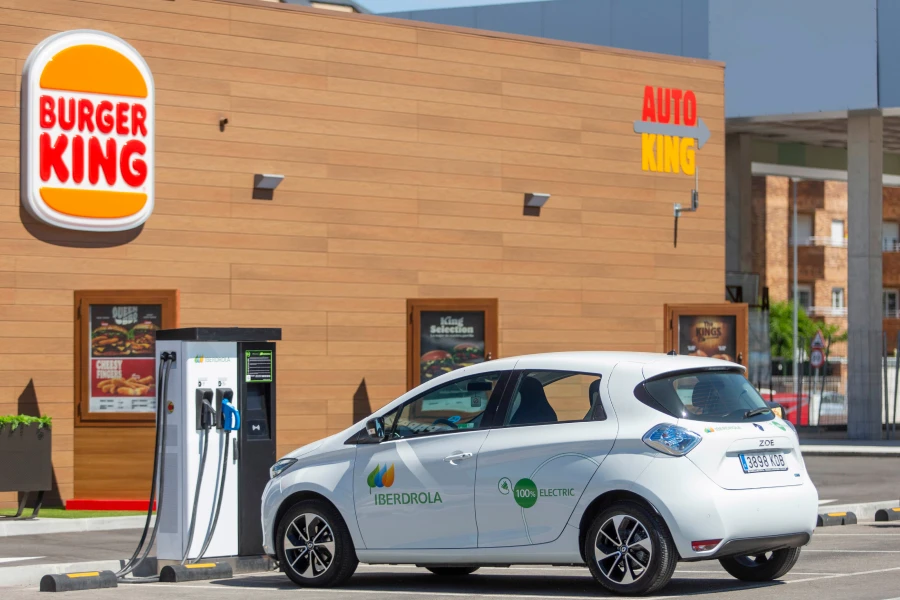Iberdrola España will supply renewable energy to all Burger King restaurants
- The energy Group will supply a total of 1,500 GWh during the term of the contract − which will cover the annual demand of over 750 restaurants
- The energy will come from the Francisco Pizarro photovoltaic plant (Cáceres), with an installed capacity of 553 M

This is another step forward in the restaurant chain's goal to achieve 100% energy from renewable sources. Iberdrola and Burger King have signed a new long-term Power Purchase Agreement − known as PPAs − in Spain. Furthermore, both companies are committed to working together to seek new opportunities to promote the use of clean energy, leading to a more energy efficient business model.
This new agreement will allow Iberdrola to supply the restaurant chain with a total of 1,500 Gigawatt hours (GWh) of photovoltaic (PV) energy, contributing to accelerating Burger King's path towards decarbonisation and increasing its energy security.
The energy will come from the Francisco Pizarro photovoltaic plant (Cáceres), which, with an installed capacity of 553 MW, provides renewable energy equivalent to the consumption of 334,400 households − avoiding the emission into the atmosphere of 150,000 tonnes of CO2 annually and reducing the carbon footprint. Specifically, 75 MW of the photovoltaic plant will be used to meet Burger King's energy needs.
In addition, and as part of the common goal of both companies to reduce CO2 emissions and meet energy transition targets, Iberdrola and bp pulse are managing 154 charging points, with 306 available spots, at 135 locations at Burger King's main facilities in Spain, also providing management and optimisation services for their operation. In 2021, both companies signed a collaboration agreement for installing charging points for electric vehicles (EV) in their restaurants.
David Martínez, Iberdrola España’s Director of Customer Business said: "With this agreement, both companies endorse our commitment to a cleaner and smarter future. Renewables have proven their ability to supply energy at affordable and stable prices and long-term PPAs have become a useful tool for managing the electricity supply of large consumers committed to green and sustainable consumption. Such long-term agreements are increasingly important to enable progress in decarbonisation and sustainability of the economy.
Luis Hérault, the CEO of Restaurant Brands Iberia, the group that manages the Burger King master franchise in Spain and Portugal, commented that "this is an initiative that adds value to our commitment to the use of green energy, to make our business model even more energy efficient. Iberdrola is undoubtedly the outstanding partner with which to work hand in hand to achieve this goal, as we have been working together for three years, with magnificent results".
Leaders in long-term contracts
Iberdrola has extensive experience in the field of PPAs and manages long-term power purchase and sale agreements in markets such as Spain, the United Kingdom, the United States, Mexico and Australia, from onshore and offshore wind projects, as well as photovoltaic projects. More than a decade ago, the Group began to develop this type of agreement and today Iberdrola is the leader in the PPA ranking in Europe, according to the consultancy firm Pexapark. In addition, Iberdrola announced that it has sold around 90% of the energy it plans to generate between 2024 and 2025.
Sustainability Master Plan 2023-2026 of Restaurant Brands Iberia
This Strategic Plan defines the Group's sustainability positioning and roadmap, analysing the three ESG pillars − environmental, social and governance − as well as other aspects that have a cross-cutting impact on them.
The Plan includes over 50 initiatives, such as replacing the motorbikes fleet of its own home delivery service with electric vehicles (EV), installing solar panels in more than 250 restaurants in the country, or the Net-Zero Plan, which details its commitment to reduce Greenhouse Gases and its goal to become a zero-emissions company by 2050.
